24. Kinh Pháp Cú – Chương 24: Phẩm Tham Ái – Craving – Song ngữ
Dhammapada Sutta (The Path of Truth)
Kinh Pháp Cú
English: Bhikkhu Khantipalo & Sister Susanna, 1993
Vietnamese: Thích Minh Châu, 1996
Illustrated Photos: Venerable-mahasi-sayadaw
Compile: Lotus group
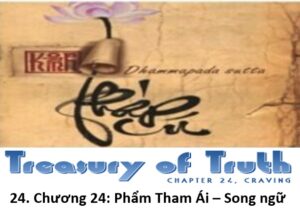
Chapter 24: Tanha Vagga – Craving (334-359)
24. Kinh Pháp Cú – Chương 24: Giảng Lược Phẩm Tham Ái – Song ngữ
Verse 334. The Increase Of Craving
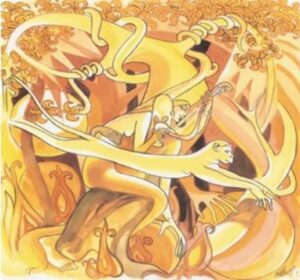
As creeping ivy craving grows
in one living carelessly.
Like this, one leaps from life to life
as ape in the forest seeking fruit.
“Người sống đời phóng dật
Ái tăng như giây leo.
Nhảy đời này đời khác
Như vượn tham quả rừng.”
Explanation:
The craving of one given to heedless living grows like a creeper. Like the monkey seeking fruits in the forest, he leaps from life to life (tasting the fruit of his kamma).
- Nếu buông lung thì tham ái tăng lên hoài như giống cỏ Tỳ la na mọc tràn lan, từ đời này tiếp đến đời nọ như vượn chuyền cây tìm trái.
Verse 335. How Craving Increases
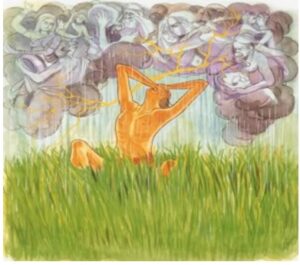
Whomsoever in this world
this wretched clinging craving routs
for such a one do sorrows grow
as grass well-soaked with rain.
“Ai sống trong đời này,
Bị ái dục buộc ràng
Sầu khổ sẽ tăng trưởng,
Như cỏ Bi gặp mưa.”
Explanation:
Whoever is overcome by this wretched and sticky craving, his sorrows grow like grass after the rains.
- Nếu ở thế gian này, mà bị ái dục buộc ràng, thì những điều sầu khổ càng tăng mãi như loài cỏ Tỳ la gặp mưa.
Verse 336. Escaping Craving
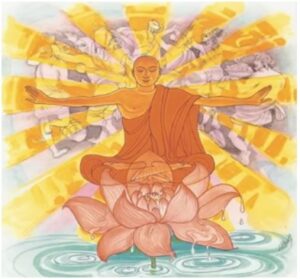
But whoever in the world
routs wretched craving hard to quell,
from such a one do sorrows fall
like water drops from lotus leaf.
“Ai sống trong đời này
Ái dục được hàng phục
Sầu rơi khỏi người ấy
Như giọt nước lá sen.”
Explanation:
But whoever overcomes this wretched craving, so difficult to overcome, from him sorrows fall away like water from a lotus leaf.
- Nếu ở thế gian này, mà hàng phục được những ái dục khó hàng phục, thì sầu khổ tự nhiên rụng tàn như nước giọt lá sen.
Verse 337. Uprooting Craving
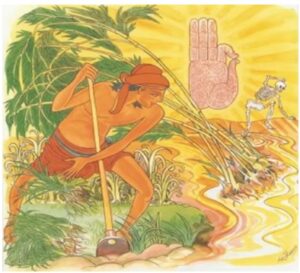
Prosperity to you, I say,
to all assembled here!
When needing grass’s fragrant root
so craving extirpate.
Don’t let Mara break you again
and again as a torrent a reed!
“Ðây điều lành Ta dạy,
Các người tụ họp đây.
Hãy nhổ tận gốc ái
Như nhổ gốc cỏ Bi.
Chớ để ma phá hoại,
Như giòng nước cỏ lau.”
Explanation:
This I say to you: Good luck to all assembled here! Dig up the root of craving, like one in search of the fragrant roots of birana grass. Let not Mara crush you again and again, as a flood crushes a reed.
- Đây là sự lành mà Ta bảo với các ngươi: các ngươi hãy dồn sức vào để nhổ sạch gốc ái dục, như người muốn trừ sạch giống cỏ Tỳ la phải nhổ hết gốc nó. Các ngươi chớ lại để bị ma làm hại như loài cỏ lau gặp cơn hồng thủy!
Verse 338. Craving Uneradicated Brings Suffering Over and Over
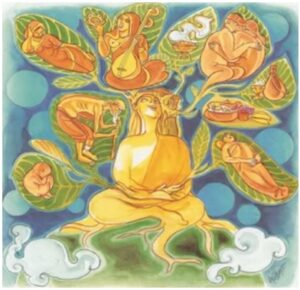
As tree though felled shoots up again
it its roots are safe and firm
so this dukkha grows again
while latent craving’s unremoved.
“Như cây bị chặt đốn,
Gốc chưa hại vẫn bền
Ái tùy miên chưa nhổ,
Khổ này vẫn sanh hoài.”
Explanation:
Just as a tree, though cut down, sprouts up again if its roots remain uncut and firm, even so, until the craving that lies dormant is rooted out, suffering springs up again and again.
- Đốn cây mà chưa đào lấy gốc rễ thì tược vẫn ra hoài, đoạn trừ ái dục mà chưa sạch căn gốc thì khổ não vẫn sanh trở lại mãi.
Verse 339. Caught In The Currents Of Craving
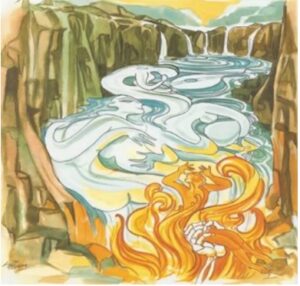
For whom the six and thirty streams
so forceful flow to seeming sweet
floods of thought that spring from lust
sweep off such wrong viewholder.
“Ba mươi sáu dòng Ái (1),
Trôi người đốn khả ái.
Các tư tưởng tham ái.
Cuốn trôi người tà kiến.”
Explanation:
The misguided man in whom the thirty-six currents of craving strongly rush toward pleasurable objects, is swept away by the flood of his passionate thoughts.
- Những người có đủ 36 giòng ái dục, họ mạnh mẽ dong ruổi theo dục cảnh chẳng chút ngại ngùng, bởi vậy, người đã có tâm tà kiến, hằng bị những tư tưởng ái dục làm trôi giạt hoài.
Verse 340. The Creeper of Craving
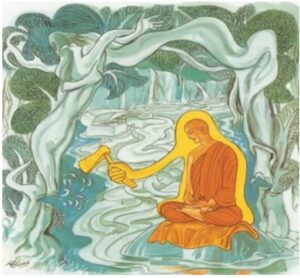
Everywhere these streams are swirling,
up-bursting creepers rooted firm.
Seeing the craving-creeper there
with wisdom cut its root!
“Dòng ái dục chảy khắp,
Như giây leo mọc tràn,
Thấy giây leo vừa sanh,
Với tuệ, hãy đoạn gốc.”
Explanation:
Everywhere these currents flow, and the creeper (of craving) sprouts and grows. Seeing that the creeper has sprung up, cut off its roots with wisdom.
- Lòng ái dục tuôn chảy khắp nơi như giống cỏ Man la mọc tràn lan mặt đất. Ngươi hãy xem giống cỏ đó để dùng tuệ kiếm đoạn hết căn gốc ái dục đi.
Verse 341. Bliss Does Not Come Through Craving
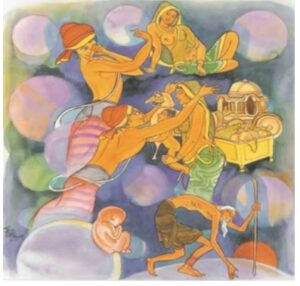
To beings there are pleasures streaming
sticky with desire,
steeped in comfort, happiness seeking,
such ones do come to birth, decay.
“Người đời nhớ ái dục,
Ưa thích các hỷ lạc.
Tuy mong cầu an lạc,
Họ vẫn phải sanh già.”
Explanation:
Flowing in (from all objects) and watered by craving, feelings of pleasure arise in beings. Bent on pleasures and seeking enjoyment, these men fall prey to birth and decay.
341. Người đời thường ưa thích theo ái dục, ưa dong ruổi lục trần, tuy họ có hướng cầu an lạc mà vẫn bị quanh quẩn trong chốn trầm luân.
Verse 342. The Bonds That Entrap Men
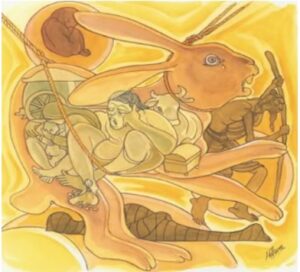
Who follow craving are assailed,
they tremble as the hare ensnared,
held fast by fetter and by bonds
so long they come to dukkha again.
“Người bị ái buộc ràng,
Vùng vẫy và hoảng sợ,
Như thỏ bị sa lưới.
Họ sanh ái trói buộc,
Chịu khổ đau dài dài.”
Explanation:
Beset by craving, people run about like an entrapped hare. Held fast by mental fetters, they come to suffering again and again and again for a long time.
- Những người trì trục theo ái dục khác nào thỏ bị sa lưới, càng buộc ràng với phiền não, càng trở lại chịu khổ lâu dài.
Verse 343. Nibbana By Shunning Craving
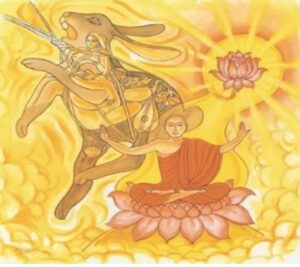
Who follow craving are assailed,
they tremble as the hare ensnared,
so let a bhikkhu craving quell
whose aim is passionlessness
“Người bị ái buộc ràng,
Vùng vẫy và hoảng sợ,
Như thỏ bị sa lưới.
Do vậy vị tỷ kheo,
Mong cầu mình ly tham
Nên nhiếp phục ái dục.”
Explanation:
Beset by craving, people run about like an entrapped hare. Therefore, one who yearns to be passion-free should destroy his own craving.
- Những người trì trục theo ái dục, khác nào thỏ bị sa lưới. Hàng Tỳ kheo vì cầu vô dục nên phải tự gắng lìa dục.
Verse 344. Freed From Craving Runs Back To Craving
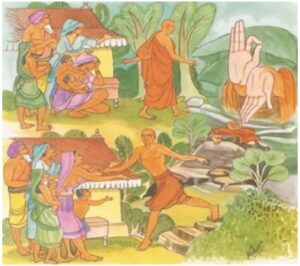
Who without woodness inclines to the wood.
Free in the wood to woodness returns.
Do now regard that person well
who free returns to fetter.
“Lìa rừng lại hướng rừng (2)
Thoát rừng chạy theo rừng.
Nên xem người như vậy,
Ðược thoát khỏi buộc ràng.
Lại chạy theo ràng buộc.”
Explanation:
There is one who, turning away from desire (for household life) takes to the life of the forest (i.e. of a monk). But after being freed from the household, he runs back to it. Behold that man! Though freed, he runs back to that very bondage!
- Người đã lìa dục xuất gia, vui ở chốn sơn lâm, rồi trở về nhà lại; ngươi hãy xem hạng người đó, kẻ đã được mở ra rồi lại tự trói vào.
Verse 345. Bonds Of Attachment
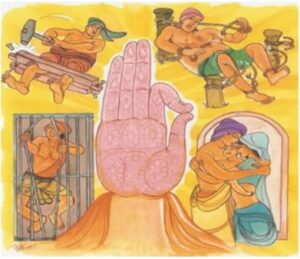
Neither of iron nor wood nor hemp
is bond so strong, proclaim the wise,
as passion’s yearn for sons, for wives,
for gems and ornaments.
“Sắt, cây, gai trói buộc
Người trí xem chưa bền.
Tham châu báu, trang sức
Tham vọng vợ và con.”
Verse 346. Bonds Are Strong, But The Wise Get Rid Of Them
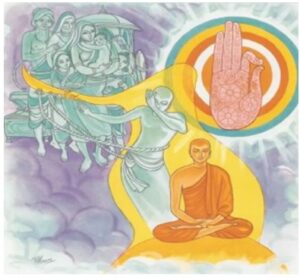
That bond is strong, proclaim the wise,
down-dragging, pliable, hard to lose.
This passion severed, they wander forth
forsaking sensual pleasures.
“Người có trí nói rằng:
“Trói buộc này thật bền.
Rì kéo xuống, lún xuống,
Nhưng thật sự khó thoát.
Người trí cắt trừ nó,
Bỏ dục lạc, không màng.”
Explanation:
345-346 That is not a strong fetter, the wise say, which is made of iron, wood or hemp. But the infatuation and longing for jewels and ornaments, children and wives – that, they say, is a far stronger fetter, which pulls one downward and, though seemingly loose, is hard to remove. This, too, the wise cut off. Giving up sensual pleasure, and without any longing, they renounce the world.
- Đối với người trí, sự trói buộc bằng dây gai, bằng cây, bằng sắt chưa phải kiên cố, chỉ có lòng luyến ái vợ con, tài sản mới thật là sự trói buộc chắc bền.
- Những kẻ dắt người vào sa đọa, là như sự trói buộc chắc bền, nó hình như khoan dung hòa huởn mà thật khó lòng thoát ra. Hãy đoạn trừ đừng dính mắc, lìa dục mà xuất gia.
Verse 347. Spider Web Of Passion
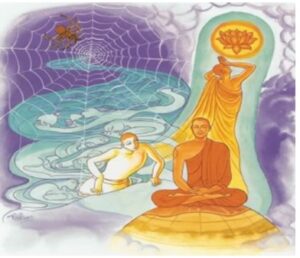
Ensnared in passion back they fall
as spider on a self-spun web.
This passion severed, wander the wise
forsaking dukkha all.
“Người đắm say ái dục
Tự lao mình xuống dòng
Như nhện sa lưới dệt.
Người trí cắt trừ nó,
Bỏ mọi khổ, không màng.”
Explanation:
Those who are lust-infatuated fall back into the swirling current (of samsara) like a spider on its self-spun web. This, too, the wise cut off. Without any longing, they abandon all suffering and renounce the world.
- Những người say đắm theo dục, tự lao mình trong lưới buộc như nhện giăng tơ. Ai dứt được sự buộc ràng không còn dính mắc nữa, thì sẽ xa mọi thống khổ để ngao du tự tại.
Verse 348. Reaching The Further Shore
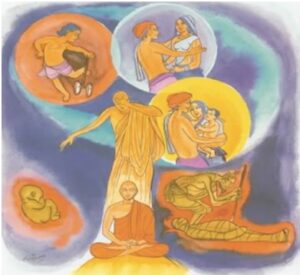
Let go before, let go the after,
let go the middle, beyond the becoming.
With mind released in every way
you’ll come no more to birth, decay.
“Bỏ quá, hiện, vị lai,
Ðến bờ kia cuộc đời,
Ý giải thoát tất cả,
Chớ vướng lại sanh già.”
Explanation:
Let go of the past, let go of the future, let go of the present, and cross over to the farther shore of existence. With mind wholly liberated, you shall come no more to birth and death.
- Bỏ quá khứ, hiện tại, vị lai mà vượt qua bờ kia; tâm đã giải thoát tất cả, thì không còn bị sanh già trở lại.
Verse 349. Craving Tightens Bonds
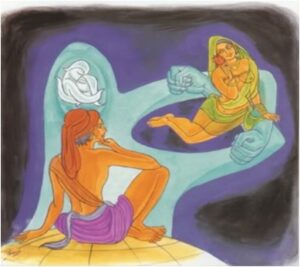
For one who’s crushed by thinking much
excessive lust from beauty’s sight,
for that one craving grows the more,
that one makes strong the bonds.
“Người tà ý nhiếp phục,
Tham sắc bén nhìn tịnh,
Người ấy ái tăng trưởng,
Làm giây trói mình chặt.”
Explanation:
For a person tormented by evil thoughts, who is passion dominated and given to the pursuit of pleasure, his craving steadily grows. He makes the fetter strong indeed.
349. Những kẻ bị tư tưởng xấu ác làm tao loạn, thường cầu mong dục lạc thật nhiều. Mong dục lạc tăng nhiều là tự trói mình càng thêm chắc chắn.
Verse 350. He Cuts Off Bonds Of Mara
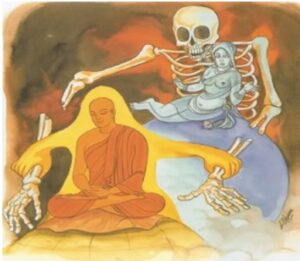
But who delights in calming thoughts
develops constant mindfulness,
that one indeed will make an End,
will sever Mara’s bonds.
“Ai vui, an tịnh ý,
Quán bất tịnh, thường niệm,
Người ấy sẽ diệt ái,
Cắt đứt Ma trói buộc.”
Explanation:
He who delights in subduing evil thoughts, who meditates on the impurities and is ever mindful – it is he who will make an end of craving and rend asunder Mara’a fetter.
350. Muốn lìa xa ác tưởng hãy thường nghĩ tới bất tịnh. Hãy trừ hết ái dục, đừng để ác ma buộc ràng.
Verse 351. The Person Who Has Reached The Goal
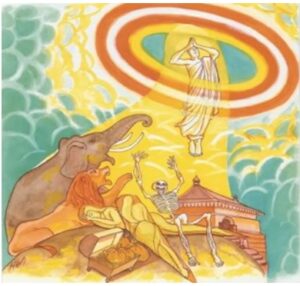
One who’s fearless, reached the End,
of craving and of blemish free,
who has becoming’s thorn plucked out,
has this, a final body.
“Ai tới đích, không sợ,
Ly ái, không nhiễm ô
Nhổ mũi tên sanh tử,
Thân này thân cuối cùng.”
Explanation:
He who has reached the goal, is fearless, free from craving, passionless, and has plucked out the thorns of existence – for him this is the last body.
- Bước tới chỗ cứu kính thì không còn sợ hãi; xa lìa ái dục thì không còn nhiễm ô; nhổ lấy mũi tên sanh tử thì chỉ còn một thân này là cuối cùng, không bị tiếp tục sanh nữa.
Verse 352. The Man Of Great Wisdom
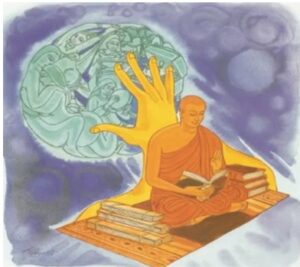
One of clinging-craving free,
who’s skilled in way of chanting,
knowing the wording-sequence,
of what precedes and follows,
possessed of final body,
one greatly wise, great person called.
“Ái lìa, không chấp thủ.
Cú pháp khéo biện tài
Thấu suốt từ vô ngại,
Hiểu thứ lớp trước sau.
Thân này thân cuối cùng
Vị như vậy được gọi,
Bậc Ðại trí, đại nhân.”
Explanation:
He who is free from craving and attachment, is perfect in uncovering the true meaning of the Teaching, and knows the arranement of the sacred texts in correct sequence – he, indeed, is the bearer of his final body. He is truly called the profoundly wise one, the great man.
- Xa lìa ái dục không nhiễm trước, thông đạt từ vô ngại, thấu suốt nghĩa vô ngại, pháp vô ngại, và thứ lớp của tự cú [6], đó là bậc đại trí đại trượng phu, chỉ còn một thân này là cuối cùng, không bị tiếp tục sanh nữa.
Verse 353. Buddha Is Teacherless
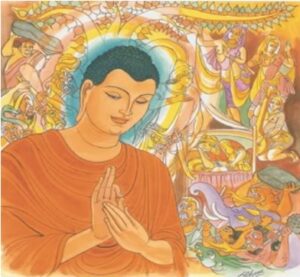
Beyond all beings, wise to all,
unsoiled by dhamma all am I,
left all and freed by craving’s end,
by self I’ve known, whom teacher call?
“Ta hàng phục tất cả,
Ta rõ biết tất cả,
Không bị nhiễm pháp nào.
Ta từ bỏ tất cả
Ái diệt, tự giải thoát.
Ðã tự mình thắng trí,
Ta gọi ai thầy ta?”
Explanation:
A victor am I over all, all have I known. Yet unattached am I to all that is conquered and known. Abandoning all, I am freed through the destruction of craving. Having thus directly comprehended all by myself, whom shall I call my teacher?
353. Ta đã hàng phục tất cả, ta đã rõ biết tất cả, ta không nhiễm một pháp nào. Ta xa lìa hết thảy, diệt dục mà giải thoát và tự mình chứng ngộ, thì còn ai là thầy ta nữa?
Verse 354. The Conquest Of All Suffering
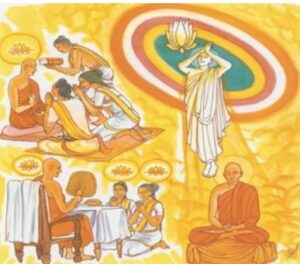
Gift of Dhamma surpasses all gifts,
the Dhamma, its taste all other tastes beats,
delight in the Dhamma bests other delights,
destruction of craving conquers all ill.
“Pháp thí, thắng mọi thí!
Pháp vị, thắng mọi vị!
Pháp hỷ, thắng mọi hỷ!
Ái diệt, dứt mọi khổ!”
Explanation:
The gift of Dhamma excels all gifts; the taste of Dhamma excels all tastes; the delight in Dhamma excels all delights. The Craving – Freed vanquishes all suffering.
- Trong các cách bố thí [7], pháp thí [8] là hơn cả; trong các chất vị, pháp vị [9] là hơn cả; trong các hỷ lạc, pháp hỷ [10] là hơn cả; người nào trừ hết mọi ái dục là vượt trên mọi đau khổ.
Verse 355. Wealth Destroys The Ignorant
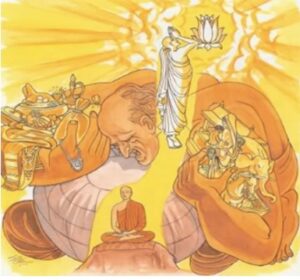
Riches ruin a foolish one
but not one seeking the Further Shore,
craving for wealth a foolish one
is ruined as if ruining others.
“Tài sản hại người ngu.
Không người tìm bờ kia
Kẻ ngu vì tham giàu,
Hại mình và hại người.”
Explanation:
Riches ruin only the foolish, not those in quest of the Beyond. By craving for riches the witless man ruins himself as well as others.
355. Giàu sang chỉ làm hại người ngu chớ không phải để cầu sang bờ giác. Người ngu bị tài dục hại mình như mình đã vì tài dục mà hại người khác.
Verse 356. Those Without The Bane Of Passion
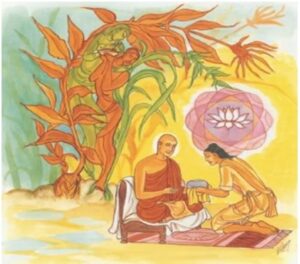
Weeds are a fault of fields,
lust’s a human fault,
thus offerings to the lustless
bear abundant fruit.
“Cỏ làm hại ruộng vườn,
Tham làm hại người đời.
Bố thí người ly tham,
Do vậy được quả lớn.”
Explanation:
Weeds are the bane of fields, lust is the bane of mankind. Therefore, what is offered to those free of lust yields abundant fruit.
- Cỏ làm hại rất nhiều ruộng vườn, tham dục làm hại rất nhiều thế nhân. Vậy nên bố thí cho người lìa tham, sẽ được quả báo lớn.
Verse 357. Those Without The Bane Of Ill-Will
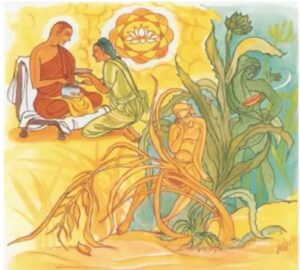
Weeds are a fault of fields,
hate’s a human fault,
hence offerings to the hateless
bear abundant fruit.
“Cỏ làm hại ruộng vườn,
Sân làm hại người đời.
Bố thí người ly sân,
Do vậy được quả lớn.”
Explanation:
Weeds are the bane of fields, hatred is the bane of mankind. Therefore, what is offered to those free of hatred yields abundant fruit.
357. Cỏ làm hại rất nhiều ruộng vườn, sân nhuế làm hại rất nhiều thế nhân. Vậy nên bố thí cho người lìa sân, sẽ được quả báo lớn.
Verse 358. Those Without The Bane Of Illusion
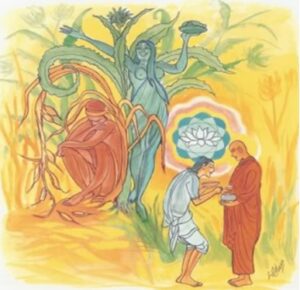
Weed are the fault of fields,
delusion, human’s faults,
so gifts to the undeluded
bear abundant fruit.
“Cỏ làm hại ruộng vườn,
Si làm hại người đời,
Bố thí người ly si,
Do vậy được quả lớn.”
Explanation:
Weeds are the bane of fields, delusion is the bane of mankind. Therefore, what is offered to those free of delusion yields abundant fruit.
- Cỏ làm hại rất nhiều ruộng vườn, ngu si làm hại rất nhiều thế nhân. Vậy nên bố thí cho người lìa si, sẽ được quả báo lớn.
Verse 359. Those Without The Bane Of Greed
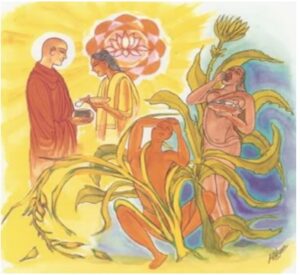
Weed are the fault of fields,
delusion, human’s faults,
so gifts to the desireless
bear abundant fruit.
“Cỏ làm hại ruộng vườn,
Dục làm hại người đời.
Bố thí người ly dục,
Do vậy được quả lớn.”
Explanation:
Weeds are the bane of fields, desire is the bane of mankind. Therefore, what is offered to those free of desire yields abundant fruit.
- Cỏ làm hại rất nhiều ruộng vườn, dục vọng làm hại rất nhiều thế nhân. Vậy nên bố thí cho người lìa dục, sẽ được quả báo lớn.
- Chú thích:
[6] Thứ lớp của tự cú: câu nầy theo nguyên văn là niruttipada kovido, dịch thẳng là “thông đạt từ và tha cú”, tức chỉ cho bốn thứ vô ngại (Catupatisambhida).
[7] Bố thí: tiếng Phạn là Dana, phiên âm là Đàn na, Trung Hoa dịch là Bố thí. Chữ bố là khắp; thí là cho. Nghĩa là dùng ba thứ tài thí, pháp thí, vô úy thí mà ban bố cho tất cả chúng sanh. Đó là nghĩa thông thường. Còn nghĩa thâm sâu hơn, bố thí nghĩa là buông xả tất cả không dính mắc bất cứ thứ gì trong tâm.
[8] Pháp thí: tiếng Phạn Dharma desana. Pháp thí là một trong ba thứ thí: tài thí, pháp thí và vô úy thí. Chữ thí có nghĩa là cho. Pháp thí là dùng lời nói thuyết pháp cho người tin nghe; cũng gọi là pháp cúng dường.
[9] Pháp vị: vị ngon của pháp; nhấm pháp vị ngon của diệu pháp mà tâm sinh khoái lạc cho nên gọi là pháp vị.
[10] Pháp hỷ: được nghe pháp hoặc được nếm mùi vị pháp mà sinh lòng hoan hỷ, thì gọi là pháp hỷ.
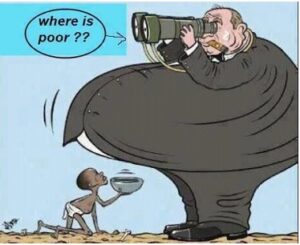
Sources:
Tài liêu tham khảo:
- http://thanhtruc-thanhtrucgdth.blogspot.com/2011/02/kinh-phap-cu.html
- http://www.buddhanet.net/dhammapada/d_monks.htm
- http://www.neatorama.com/2007/03/02/bizarro-caption-contest/
- Tam Tu Metta Buddhist Temple & Heritage Garden – 610 Fisher Ave, Morgan Hill, CA 95037
- https://quangduc.com/a29849/kinh-phap-cu-chu-giai-tap-4
